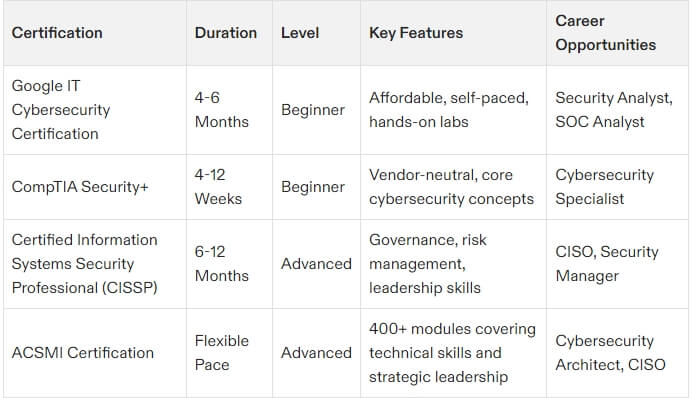Table of Contents
Cybersecurity is no longer just an IT concern—it’s a global priority. With cyberattacks becoming more frequent and sophisticated, professionals with certified expertise are in high demand. Whether you’re an IT professional considering a niche shift or a newcomer exploring cybersecurity, choosing the right IT Cybersecurity Certification can open endless opportunities. But where to start? With dozens of certifications available, each tailored to specific career paths, deciding can feel overwhelming. Should you aim for an entry-level certificate, or is an advanced certification more aligned with your goals? This comprehensive guide to IT Cybersecurity Certification walks you through every aspect, from importance and options to selecting the right certification.
What is an IT Cybersecurity Certification?
An IT Cybersecurity Certification is a professional credential that validates your expertise in various aspects of cybersecurity. These certifications are offered by trusted organizations and serve as proof that you have mastered specific skills, such as threat detection, network security, and compliance protocols.
Unlike conventional IT degrees, certifications focus on specialized topics and are typically shorter in duration. Whether you’re a beginner or an experienced professional, there’s a certification designed to fit your needs. Certifications demonstrate to employers that you have the up-to-date knowledge and practical skills they require in a cybersecurity expert.
Why Pursue IT Cybersecurity Certification?
1. High Demand for Cybersecurity Professionals
Cybersecurity is one of the fastest-growing industries, with an estimated global shortage of over 3.5 million professionals. Certifications help bridge the skills gap, allowing job seekers to stand out in a competitive market.
2. Proof of Expertise
Having an IT Cybersecurity Certification on your résumé immediately signals to employers that you have the targeted skills and knowledge to handle complex cybersecurity challenges.
3. Career Advancement
Certifications like ACSMI Certification or CISSP (Certified Information Systems Security Professional) prepare candidates for leadership roles, while entry-level options like Google’s Cybersecurity Certification help beginners secure their first job.
4. Higher Earning Potential
Certified professionals command higher salaries. A study reveals that earning certifications like CISM or CISSP can increase your salary by 20-25%, with additional benefits for specialized credentials.
5. Skill Upgradation
Cybersecurity is an evolving field. Pursuing certifications ensures you stay updated with the latest tools, techniques, and threat landscapes. Certifications like the ACSMI Certification are regularly updated to ensure maximum relevance.
Types of IT Cybersecurity Certification
1. Beginner-Level Certifications
a. CompTIA Security+
A perfect choice for newcomers, this certification covers foundational topics like network security and threat management.
b. Google Cybersecurity Certificate
Google’s program offers self-paced learning that focuses on the key skills needed for roles like Security Analyst.
2. Intermediate-Level Certifications
a. Certified Ethical Hacker (CEH)
Ideal for IT professionals keen on penetration testing, CEH emphasizes practical hacking techniques for uncovering vulnerabilities.
b. Certified Information Systems Auditor (CISA)
Focused on governance, this certification bridges IT auditing and security skills for professionals working in compliance-heavy organizations.
3. Advanced Certifications
a. Certified Information Systems Security Professional (CISSP)
This globally recognized certification covers advanced security management and governance for seasoned professionals.
b. Advanced Certified Security Master Individual (ACSMI Certification)
The ACSMI Certification features 400+ modules, offering unparalleled depth in areas like advanced cryptography, incident response, and cloud security, along with leadership training for current and aspiring CISOs.
How to Choose the Right IT Cybersecurity Certification
1. Assess Your Career Objectives
If you’re an entry-level professional, an introductory certification like Security+ or Google’s IT Cybersecurity course is a great start. For those chasing leadership roles, advanced programs like ACSMI Certification are ideal.
2. Consider the Time Investment
Certifications range in duration from weeks to over a year. Evaluate how much time you can dedicate while balancing work and other commitments. Short programs like Google’s are time-efficient, while high-level certifications like CISSP or ACSMI require more time but offer deeper learning and networking opportunities.
3. Focus on Reputation
Certifications from trusted organizations hold more weight in the job market. Popular certifications like ACSMI Certification or CISSP often come with global recognition, making them valuable for professionals seeking international opportunities.
Career Doors Opened by IT Cybersecurity Certification
Entry-Level Roles
- Cybersecurity Analyst – Monitor systems for suspicious activities.
- Incident Responder – Manage immediate responses to cyber incidents.
Intermediate Roles
- Penetration Tester – Test infrastructure for vulnerabilities to improve security.
- Threat Intelligence Analyst – Analyze and predict future attack patterns.
Advanced Roles
- Security Architect – Design robust systems for long-term security needs.
- Chief Information Security Officer (CISO) – Lead enterprise-wide security strategies.
Informative Table of Certifications
FAQs
1. What is the best IT Cybersecurity Certification for beginners?
Google’s Cybersecurity Certification and CompTIA Security+ are highly recommended for complete beginners aiming to secure entry-level job roles in cybersecurity.
2. How does ACSMI compare with other certifications?
The ACSMI Certification stands out for its breadth, covering over 400 modules with a balance between technical expertise and leadership.
3. How long does it take to complete a certification?
The duration varies by program. While Google’s takes between 4-6 months, advanced options like ACSMI Certification are self-paced and may take longer for comprehensive coverage.
4. Can I pursue certifications while working full-time?
Yes. Many certifications like Google’s and the ACSMI Certification offer flexible, self-paced schedules to help working professionals upgrade their skills.
5. Are certifications better than degrees for cybersecurity?
While degrees provide a broad foundation, certifications offer targeted, practical, and updated knowledge that is more aligned with modern cybersecurity career demands.
Final Thoughts
An IT Cybersecurity Certification isn’t just a credential; it’s a milestone toward becoming a trusted expert in one of the most critical industries today. From entry-level programs to specialized certifications like the ACSMI Certification, there’s an option tailored to every career stage. The pathway you choose depends on your goals, whether it’s launching into cybersecurity or climbing the ranks into leadership roles.
Cybersecurity is an evolving field, and staying relevant means committing to continuous education. Equip yourself with the tools and knowledge you need through a certification program that aligns with your aspirations. The right time to start is now!


Leave a Reply